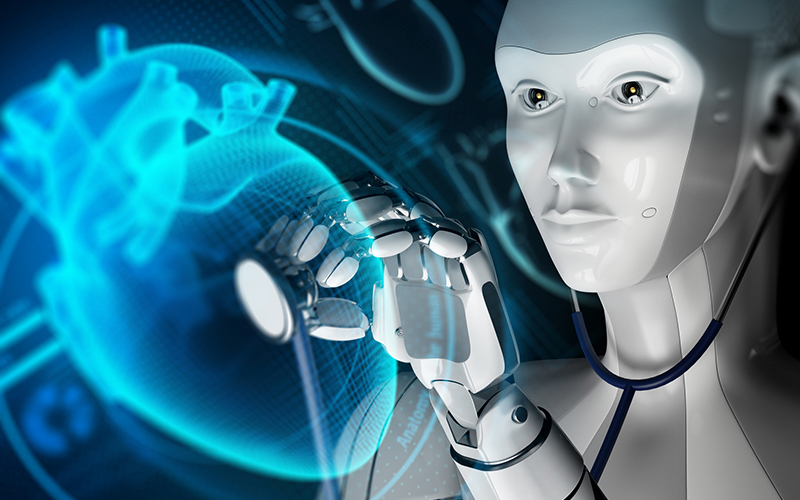Introduction
In recent years, the integration of artificial intelligence (AI) in healthcare has brought about revolutionary changes, transforming patient care in unprecedented ways. This article explores the myriad ways AI is reshaping the healthcare landscape, from diagnosis to treatment and beyond. Harnessing the power of AI, healthcare providers can deliver more accurate diagnoses, personalized treatment plans, and improved patient outcomes. Let’s delve into the intricate details of how AI is revolutionizing patient care.

1. Understanding Artificial Intelligence in Healthcare
1.1 Defining AI in Healthcare
Artificial Intelligence in Healthcare refers to the utilization of complex algorithms and software to emulate human cognitive functions in the analysis, interpretation, and comprehension of complex medical and healthcare data.
1.2 The Role of Machine Learning
Machine Learning, a subset of AI, enables systems to learn from data, identify patterns, and make decisions with minimal human intervention. In healthcare, machine learning algorithms analyze vast datasets to identify trends, predict outcomes, and optimize treatment plans.
1.3 Natural Language Processing (NLP) in Healthcare
Natural Language Processing enables computers to understand, interpret, and generate human language. In healthcare, NLP facilitates the extraction of valuable insights from unstructured medical data, such as clinical notes, radiology reports, and research articles.
1.4 Computer Vision in Medical Imaging
Computer Vision algorithms analyze medical images, such as X-rays, MRIs, and CT scans, to assist radiologists and clinicians in detecting abnormalities, diagnosing diseases, and planning interventions with greater accuracy and efficiency.
1.5 Robotic Process Automation (RPA) in Healthcare
Robotic Process Automation automates repetitive tasks and workflows, streamlining administrative processes, enhancing operational efficiency, and reducing healthcare costs, thereby enabling healthcare professionals to focus on delivering high-quality patient care.
2. Applications of AI in Diagnostics
2.1 Early Disease Detection
AI-powered diagnostic tools leverage machine learning algorithms to detect subtle patterns and anomalies in medical data, enabling early detection of diseases such as cancer, cardiovascular disorders, and neurological conditions, thereby facilitating timely intervention and improved patient outcomes.
2.2 Precision Medicine
Precision Medicine utilizes AI to analyze individual genetic, clinical, and lifestyle data to tailor treatment plans and therapies to the unique characteristics of each patient, maximizing treatment efficacy while minimizing adverse effects.
2.3 Remote Patient Monitoring
AI-driven remote patient monitoring systems collect and analyze real-time health data, enabling healthcare providers to monitor patients’ vital signs, medication adherence, and disease progression remotely, thereby improving patient outcomes and reducing hospital readmissions.
2.4 Virtual Health Assistants
Virtual health assistants powered by AI and NLP enable patients to interact with healthcare providers, schedule appointments, access medical records, and receive personalized health recommendations, enhancing patient engagement and satisfaction.
3. Enhancing Treatment and Care Delivery
3.1 Drug Discovery and Development
AI accelerates drug discovery and development processes by analyzing vast datasets, predicting drug efficacy and safety, identifying potential drug targets, and optimizing clinical trial design, thereby expediting the delivery of novel therapies to patients in need.
3.2 Surgical Robotics
Surgical robots equipped with AI algorithms enable surgeons to perform minimally invasive procedures with enhanced precision, dexterity, and control, reducing surgical trauma, minimizing complications, and shortening recovery times for patients.
3.3 Predictive Analytics
Predictive analytics powered by AI analyze patient data to forecast disease progression, identify at-risk populations, and optimize resource allocation, enabling healthcare providers to proactively intervene, prevent adverse events, and improve population health outcomes.
3.4 Personalized Patient Care
AI-driven clinical decision support systems provide healthcare providers with evidence-based recommendations, treatment guidelines, and predictive insights, enabling personalized patient care tailored to individual needs, preferences, and prognoses.
4. Addressing Ethical and Regulatory Considerations
4.1 Data Privacy and Security
Ensuring the privacy and security of patient data is paramount in the era of AI-driven healthcare. Robust data encryption, access controls, and compliance with regulations such as HIPAA are essential to safeguarding patient confidentiality and trust.
4.2 Algorithm Bias and Fairness
Addressing algorithmic bias and ensuring fairness in AI models is crucial to prevent disparities in healthcare delivery and outcomes. Transparent model development, diverse training datasets, and ongoing monitoring are key to mitigating bias and promoting equity.
4.3 Regulatory Compliance
Regulatory bodies such as the FDA play a pivotal role in overseeing the development, validation, and deployment of AI-based medical devices and software applications, ensuring their safety, efficacy, and compliance with rigorous quality standards.
5. The Future of AI in Healthcare
5.1 Advancing Medical Research
AI holds the potential to revolutionize medical research by accelerating the pace of discovery, uncovering novel insights from vast datasets, and facilitating collaborative efforts across disciplines to tackle complex healthcare challenges.
5.2 Empowering Patients
AI-driven health technologies empower patients to take a more proactive role in managing their health and well-being, enabling self-monitoring, personalized interventions, and access to health information and resources tailored to their needs.
5.3 Transforming Healthcare Delivery
The integration of AI into healthcare ecosystems promises to transform care delivery models, optimize resource allocation, and enhance the efficiency, accessibility, and affordability of healthcare services, ultimately improving health outcomes for individuals and populations alike.
Internal links : https://mrbabar.online/the-ultimate-guide-to-finding-the-perfect-gift-for-kids/
External links :
Artificial intelligence (AI) is revolutionizing healthcare in numerous ways, enhancing patient care and optimizing medical processes. From predictive analytics that forecast patient outcomes to AI-driven virtual health assistants providing 24/7 support, the potential is vast. AI’s role in drug discovery and clinical trials accelerates the development of new treatments, while advanced medical imaging tools assist in diagnosing conditions with greater accuracy.
Moreover, AI is improving administrative efficiency in healthcare systems, reducing administrative burdens, and allowing medical staff to focus more on patient care. Robotics, powered by AI, is transforming surgeries by enabling more precise and minimally invasive procedures. In rehabilitation, AI supports personalized therapy to enhance recovery.
AI’s ability to streamline operations, provide personalized treatments, and improve patient outcomes is shaping a new era in healthcare, and its potential continues to grow.
For more detailed insights, check out Harvard’s discussion on AI’s impact
Harvard Chan School of Public Health and TechBullion’s overview of AI applications in healthcare
